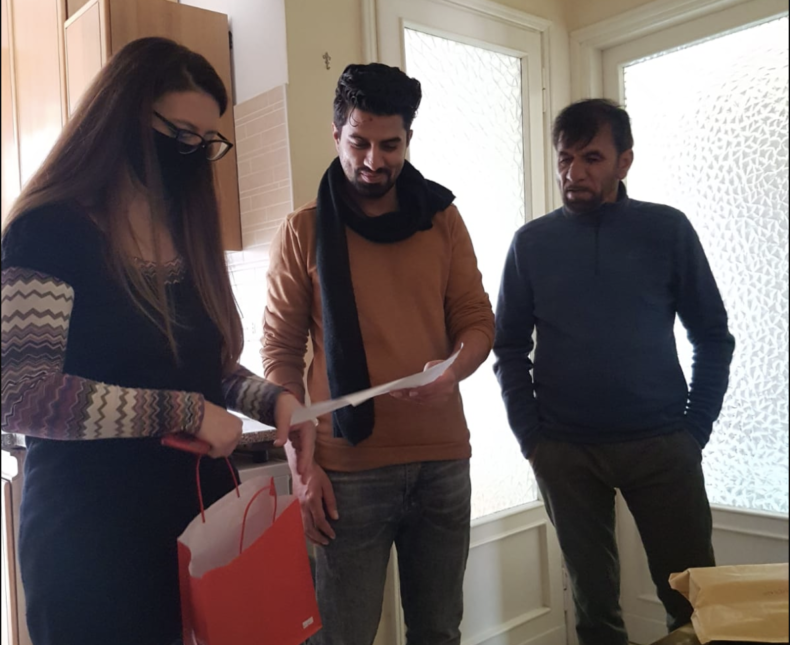UCEI scholarships for Afghan students, “The Jewish duty of helping others”

For weeks, in the summer of 2021, we talked about little else. Then, attention started fading while Afghanistan disappeared from the front pages and stopped making headlines. Yet the humanitarian crisis has not stopped for a moment and rather intensified. While Western public attention dropped and the Taliban repression increased, the challenge remains that of solidarity. As if we were still in that dramatic August in which, in the space of a few hours, the conquests of twenty years collapsed.
This is the path followed by the Union of the Italian Jewish Communities through the provision of two scholarships to as many Afghan students who, having fled their country of origin, will have the opportunity to rebuild their future in Italy. It is a project carried out in synergy with the Community of Sant’Egidio (both students arrived through humanitarian corridors) and with the international Jewish NGO HIAS which supports it financially.
A. is one of these students. A former ministerial official, he fled with his wife. With them also his sister and her eight-year-old son. “Unfortunately – he said – she became a widow: her husband, disliked by the Taliban, was brutally tortured and killed”. A. and his loved ones should have already emigrated last year. They were on one of the lists through which, in the days of the mass evacuation, thousands of Afghans managed to leave. But, while they were waiting to board, an attack sowed panic. In the turmoil that followed, their rights were not recognized and they had no choice but to go back.
Months of anguish followed until a window opened for emigration to Iran. From there, in the summer, they arrived in Italy. “I feel a deep gratitude for those who are helping us”, stresses A. However, the trauma of that August still lingers: “Twenty years of progress collapsed in an instant, and all the efforts made for democracy, peace, and rights have been thwarted”.
A., who is of Hazara ethnicity, has obtained political asylum. And in a few hours, he will start attending a university course in Northern Italy. “It is an extraordinary opportunity. I will do my best so that it will be fruitful. Going back to studying is a wonderful thing. As it is – he adds – recognizing the support and friendship of those who have lent us a hand”. The concern remains strong though: “Part of my family is still in Afghanistan, among others a younger brother. The updates I receive are terrifying: the Taliban hate the Hazari; they persecute them even inside their homes. I hope one day to be able to have them back by my side, here in Italy, and to savor the gift of freedom together “.
“Afghanistan is a tragedy on which silence must not fall” urges Milo Hasbani, UCEI vice president. In choosing to invest in education, there is “the precise will to leave a mark, a commitment to the future”. This is not the first project that has seen UCEI taking action to heal the wounds of those who, leaving Kabul, have been forced to start from scratch. At the same time, the effort undertaken in solidarity with Ukraine continues: “The commitment to give aid goes on and there is always an open channel with those who, in the meantime, have chosen to return. We must be there, working together with organizations with which we share the urgency of constant mobilization, such in the case, for example, of this project”.
“We are grateful to UCEI for participating in this tenacious commitment so as not to let indifference prevail. Just a few months have passed, but unfortunately many have forgotten about Afghanistan “, remarks Stefano Pasta of the Community of Sant’Egidio. This is a project, he continues, framed “in the context of humanitarian corridors, an initiative initially characterized as interconfessional that later became inter-religious”.
The model of humanitarian corridors, Pasta points out, “provides accommodation in families, with relatives, communities, and individuals who provide housing, through a model more integrated into the urban fabric than others”. It is an element that makes a positive difference “for someone studying at the university”. The hope is that also “the wife will be able to do so”. Ilan Cohn is the director of HIAS for Europe: “Since the establishment of an office in Brussels, we have started working with many Jewish organizations. Including, of course, UCEI. We are and we want to be more and more a point of reference in the field of humanitarian activities”. HIAS has a long and glorious history. The idea has always been that unity is strength, that together we can achieve more significant results than by acting alone. This is especially true, he points out, “in times of crisis like this”, with HIAS at work in many contexts. Starting from Ukraine, but without forgetting other fronts “less talked about”, from Africa to South America. “HIAS started helping because those who needed help were Jews. Now – the organization pointed out in a recent message – it continues to help because this is what as Jews we do: we help”.
